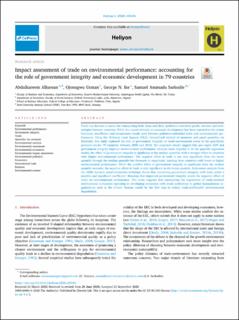| dc.contributor.author | Alhassan, Abdulkareem | |
| dc.contributor.author | Ojonugwa, Usman | |
| dc.contributor.author | N.Ike, George | |
| dc.contributor.author | Sarkodie, Samuel Asumadu | |
| dc.date.accessioned | 2021-01-29T14:05:45Z | |
| dc.date.available | 2021-01-29T14:05:45Z | |
| dc.date.created | 2020-09-25T02:40:00Z | |
| dc.date.issued | 2020 | |
| dc.identifier.citation | Alhassan, A., Ojonugwa, U., N.Ike, G. & Sarkodie, S. A. (2020). Impact assessment of trade on environmental performance: accounting for the role of government integrity and economic development in 79 countries. Heliyon, 6(9): E05046. doi: | en_US |
| dc.identifier.issn | 2405-8440 | |
| dc.identifier.uri | https://hdl.handle.net/11250/2725412 | |
| dc.description.abstract | Trade has become a carrier for transporting both clean and dirty (pollution-intensive) goods, services and technologies between countries. While the impact of trade on economic development has been reported in the extant literature, insufficient and inconsistent results exist between pollution-embedded trade and environmental performance. Using the Ordinary Least Squares (OLS), Generalized method of moments and panel quantiles via Moments, this study explored the role of government integrity on trade-environment nexus in the post-Kyoto protocol era for 79 countries between 2008 and 2018. The empirical results suggest that per capita GDP and government integrity improve environmental performance whereas trade impedes it. In the quantile regression model, the effect of government integrity is significant at the median quantiles with a stronger effect in countries with higher environmental performance. The negative effect of trade is not only significant from the lower quantile through the median quantile but decreases in magnitude, tracking from countries with lower to higher environmental performance. While the positive effect of government integrity is significant from the median quantile onwards, the negative effect of trade is only significant in the lower quantile. Robustness analysis from the GMM dynamic panel estimation technique shows that interacting government integrity with trade yields a positive and significant coefficient. Meaning that improved government integrity averts the negative effect of trade on environmental performance. The study suggests that outsourcing the regulations of trade-oriented multinational companies operating in developing economies with weak institutions to global humanitarian organisations such as the United Nations would be the first step to reduce trade-attributable environmental degradation. | en_US |
| dc.language.iso | eng | en_US |
| dc.publisher | Elsevier | en_US |
| dc.rights | Attribution-NonCommercial-NoDerivatives 4.0 Internasjonal | * |
| dc.rights | Attribution-NonCommercial-NoDerivatives 4.0 Internasjonal | * |
| dc.rights.uri | http://creativecommons.org/licenses/by-nc-nd/4.0/deed.no | * |
| dc.title | Impact assessment of trade on environmental performance: accounting for the role of government integrity and economic development in 79 countries | en_US |
| dc.type | Peer reviewed | en_US |
| dc.type | Journal article | en_US |
| dc.description.version | publishedVersion | en_US |
| dc.rights.holder | © 2020 The Author(s) | en_US |
| dc.subject.nsi | VDP::Matematikk og Naturvitenskap: 400 | en_US |
| dc.subject.nsi | VDP::Samfunnsvitenskap: 200 | en_US |
| dc.subject.nsi | VDP::Samfunnsvitenskap: 200::Økonomi: 210 | en_US |
| dc.source.volume | 6 | en_US |
| dc.source.journal | Heliyon | en_US |
| dc.source.issue | 9 | en_US |
| dc.identifier.doi | 10.1016/j.heliyon.2020.e05046 | |
| dc.identifier.cristin | 1833265 | |

